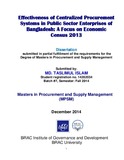| dc.description.abstract | Procurement constitutes a major part of expenditures in an organisation. In private sector organisations where profitability is the main objective, a little cost savings in procurement can lead to big contribution to the profitability. In case of public sector organizations, service to people rather than profitability is the main objective and achieving value for money (economy, efficiency and effectiveness) is the main consideration in procurement. Although procurement and purchasing are used interchangeably, they have subtle differences. However, in this paper procurement and purchasing have often been used interchangeably as it deals with only the buying of goods and services by the Economic Census project authority. In case of an effective procurement, the concept of „five rights‟ is a much-talked-about phrase. It means „to acquire right amount of goods in right quality for right price at right time in the right place‟. There are various systems of procurement to be followed by both private and public sector organisations. Centralised and decentralised systems are prominent. Some hybrid systems are in vogue now-a-days. All the systems have some advantages and weaknesses. Public sector organisations have wide range of choices for using any of the systems in order to achieve value for money. Debates are going on about the effectiveness of centralisation of procurements. Attempt has been made to study the effectiveness of such system. So the main objective of this study is to assess the effectiveness of centralised procurement system in Economic Census in particular and public sector in general. In this study due to obvious reason we have selected only one project named Economic Census 2013 as our field of study. The effectiveness was assessed on the basis of quality of materials purchased, economy of scale achieved and improvement of lead time. Based on this study it is very difficult to comment about the effectiveness of centralised system of procurement in public sector as a whole. The study relied on both primary and secondary sources for necessary data and information. Questionnaire survey was the source of primary data. A structured questionnaire has been used for this purpose. Questionnaire survey was conducted on 10 different level-BBS-officers those who had experience of purchasing goods. As various sections of officials engaged in procurement were covered under questionnaire survey, the study is a representative one which can be deemed as the reflection of views of all officials involved in implementation of the Economic Census operation. In our study it is found that there is a significant difference between the previous and present systems of procurement. Eventually both of them have some advantages and weaknesses as well. The quality and price have significantly improved in centralised system but the lead time of the procurement has deteriorated. It means that although right quality of goods was procured at right price but they could not be procured in right time. The findings of the study reveal that the present process of purchasing is effective for the Economic Census with a problem in lead time which should be addressed. So the cost-quality-time triangle or “the iron triangle” in which a balance is stricken between the three has to be considered in case of public procurement. For this reason, a hybrid system has been recommended as a more effective system. This system has been running successfully in a public sector organisation REB by name. | en_US |

